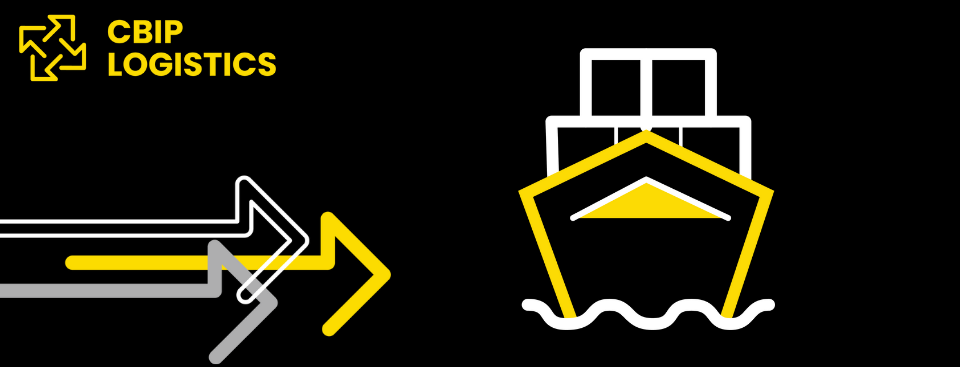How Technology is Transforming Logistics: The Shipping Edition

When you hear the words ‘high-tech’ and ‘futuristic,’ ocean shipping may not be the first thing that comes to mind. But some of the biggest advances in AI and robotics the world has ever seen are transforming this sector as we speak.
The need to streamline operations on the high seas has never been stronger. Today, maritime shipping accounts for 90% of global trade — and ocean freight demand is expected to continue to rise.
Read About CBIP’s Global 4PL Logistics Services
Let’s take a look at how technology is pushing shipping into the future and the ways in which it could affect your business.
LONG-HAUL, GREENER CARGO SHIPS — MINUS THE CREW
What’s a ship without a crew? You’ve likely heard of autonomous cars, but now the trend has reached the open seas.
This year, there’s a global shortage of over 26,000 seafarers. According to reports from trade associations BIMCO and ICS, if rapid action isn’t taken this number could climb to nearly 90,000.
Today, companies are racing to develop long-haul ships that rely on AI for navigation and high-tech machinery to carry out tasks previously done by merchant sailors — and the timing couldn’t be better.
For businesses, increasingly automated ships mean:
- More reliable ocean freight transit times due to fewer delays from crew shortages
- Lower costs. On a given ship, 30% of the total cost is normally devoted to crew payment and expenses
- Real-time tracking and vessel databases that let you know the most up-to-date status of fleets
Incentives of cost in addition to sustainability further fuels the fire for developers of autonomous ships to create the next generation of unmanned ocean vehicles.
Most recently, the YARA Birkeland ship in Norway upped the ante by not only operating without a crew, but also by making history as the first fully electric container ship.
Though the YARA Birkeland’s journey was short, it has opened the possibilities for a future where labor and energy efficiency can both play a part in long-haul shipping.
AGE-OLD PORTS WITH A MODERN TOUCH
No matter how advanced shipping becomes, one feature is here to stay: the port. But even this mainstay of the industry is finally beginning to change.
These days, international ports are under more strain than ever due to:
- Container shipping, which demands more space and depth for a given port. As ships get larger to accommodate containers, they require a certain ‘draft,’ or required depth.
- Globalization and more complex supply chains, linking countries around the world and establishing more and more new routes reliant on international ports that can support large cargo volumes.
- Demands for faster shipping — even of imported goods — which in turn makes the volume of goods entering ports increase.
Issues like these are why Singapore is now developing what is set to be the world’s largest automated shipping terminal.
RELATED: Five Dominant 3PL Trends in Asia Today
Long a crucial point for international shipping, the Port of Singapore sees 2-3 ships arrive or leave every minute. Now, they’re building the new Tuas Port to eventually take over as Singapore’s main maritime entry point and solidify it as a hub of the future.
Though it’s still in its early stages of development, the Tuas Port plans to have a capacity of 65 million twenty-foot equivalent units and will utilize AI and machine learning to carry out its operations as a smart port.
Learn more about the ambitious plan below:
A QUANTUM LEAP TOWARD OPTIMIZED ROUTES
Finding the right routes that can adapt to changes quickly is a challenge — even for supercomputers. When variables that affect shipping times and efficiency are each minute, the need for advanced forecasting and finding a way to take multiple variables into account has left many people scratching their heads.
Now, however, route optimization is reaching new frontiers through quantum computing.
Quantum computing goes beyond the dimensions of traditional computers and creates models that account for exponential, rather than linear, growth. The field was developed to help run advanced simulations with complicated variables and has been used in medical research and to design radar systems.
So how does this relate to getting your goods from point A to point B?
When the Suez Canal was blocked in March of 2021, the costs added up — and fast. Estimates show that each day of halted ship traffic resulted in losses of $US9.6 billion per day. In order to make sure an event like this has alternatives, quantum computing may have a role to play.
This may be a tool used by global logistics providers soon rather than later. Recently, IBM teamed up with Exxon Mobil to develop route optimization platforms that could allow fleets of ships to receive constantly updated routes and optimized directions.
Quantum computing is able to simultaneously include variables like weather patterns, inventory and staffing changes, and just how long a given trip might take in order to create which saves time — and money.
Down the line, this type of preparedness could even make unexpected global events — say, a blocked canal that accounts for almost 30% of the world’s daily traffic of shipping containers — a little easier to handle.
SHIP WITH THE LATEST TECHNOLOGY AT CBIP
Want to stay in the loop on the latest changes in global shipping and make sure your business sees the benefits?
At CBIP, we’re constantly updating our network with partner providers working on the cutting edge of the industry.
For your shipping needs, you get reliable, comprehensive coverage all backed up by our in-house software that lets you see your freight from start to finish. Get custom, integrated softwares that move you into the future alongside the peace of mind you need to expand your operations to the world.
To learn how CBIP can help your global logistics work smarter and craft an ocean shipping plan that fits your business, get in touch for a free assessment today.






